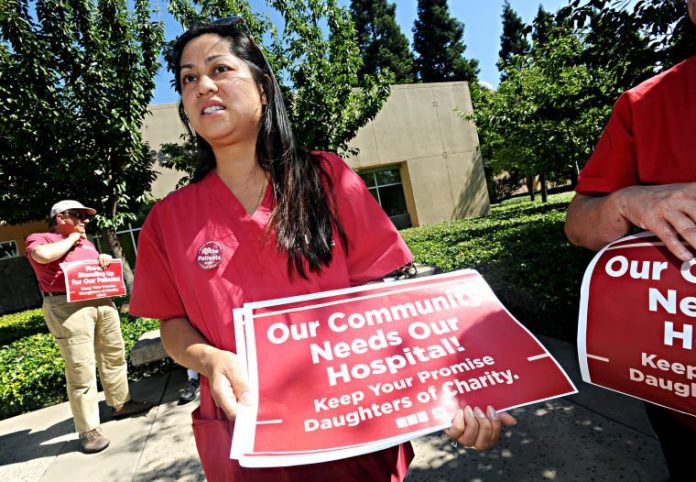
The pending sale of the Daughters of Charity Health System to Prime Healthcare—which has drawn the scrutiny of U.S. congressional representatives—will be the topic of a Jan. 8 public meeting in Gilroy.
The 10 a.m. meeting at Gilroy City Hall’s Council chambers will be hosted by the California Attorney General’s office, which will conduct a review of the sale of the health system before approving or rejecting it. The public meeting, as well as a similar one Jan. 7 at O’Connor Hospital in San Jose, are part of the attorney general’s review process, according to authorities.
The sale of DCHS to Prime, a for-profit company, was announced in October. It includes Saint Louise Regional Hospital in Gilroy, which serves South County with 96 beds and an emergency room that saw 26,000 visits in 2012. The sale proposal also includes the DePaul Medical Center campus in Morgan Hill, which houses an Urgent Care facility as well as a number of private physicians’ offices.
The public meeting at Gilroy City Hall, 7351 Rosanna Street, will follow the attorney general’s evaluation of the current state of SLRH and each of DCHS’ six hospitals to be completed by the end of December, according to Morgan Hill city staff.
Since DCHS officials announced Prime Healthcare as the top bidder for the six-hospital system, after a lengthy bid solicitation and internal review process, a chorus of concerns has raised from the local to the federal level, both in support of and in opposition to the sale.
Planning to attend both public meetings in Gilroy and San Jose is state Sen. Bill Monning, who represents the 17th district which includes Morgan Hill, Gilroy and the rest of South County. Unlike other officials on the Central Coast, Monning has not yet formed a steadfast position on the pending sale to Prime.
He hopes to discover the questions and concerns of the public in order to research the issue further before offering his own input, according to California Democratic Party Central Committee delegate Swanee Edwards, who acts as the senator’s “eyes and ears” in the South County portion of Monning’s vast district.
“There are people who are very much against this sale, and there are people who are very much against it, and we need to get to the bottom of what’s best for the South County residents,” said Edwards, who lives in San Martin.
Among those concerned with the sale of the currently nonprofit health system to Prime are Santa Clara County Supervisor Mike Wasserman and 18 U.S. Congressional representatives—including Zoe Lofgren who represents Morgan Hill—who penned a letter urging the attorney general to reject the sale Dec. 11.
Those congressional representatives cited Prime’s “history of unfair business practices” as the chief reason for their opposition. Wasserman has said he is concerned about the loss of healthcare access to lower-income residents that could result from the sale of SLRH and O’Connor to a for-profit provider.
Supporting the sale are the Gilroy Chamber of Commerce and the California Nurses Association, which represents nurses employed at SLRH and other DCHS facilities.
DCHS executives have said Prime was by far the most qualified bidder to take over the entire system. The company has promised to keep all six hospitals open for at least another five years, invest $150 million in capital improvements at the DCHS facilities, retain DCHS’ existing 7,600 employees and assume more than $300 million in pension guarantees for about 17,000 union and non-union active and retired workers.
SLRH Foundation board member Bernie Mulligan, a Morgan Hill resident, also plans to attend the Jan. 8 meeting in Gilroy. With DCHS losing $10 million per month, according to DCHS executives, Mulligan said the impact of a rejection of the sale to Prime would be dire.
“I am very much in favor of the sale being approved,” Mulligan said. “They are losing millions of dollars each year, and if the attorney general fails to approve the sale, the only other alternative is bankruptcy.”












